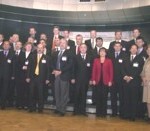 The MD states that representatives of Governments from Europe and North Asia and from other participating countries:
The MD states that representatives of Governments from Europe and North Asia and from other participating countries: underline that all countries have the sovereign right to manage and utilize their forest resources;
recognize that FLEG has local, national, transboundary, regional and global implications;
are convinced of a shared responsibility to eliminate illegal harvesting of forest resources and associated trade;
emphasize that FLEG is a cross-sectoral and complex as well as sensitive issue;
recognize that forests of the ENA-FLEG region, comprising over a third of global forest cover, are of global importance;
are aware that forests of the ENA-FLEG region are critical to the livelihoods of hundreds of millions of people, provide economic, social, cultural and environmental benefits, and meet energy needs of local populations;
emphasize the fundamental role of governments in providing effective governance, including laws and capacity to enforce them, to eliminate illegal logging, associated trade and corruption in the forest sector, and;
are concerned that forests-related crime is a significant problem in many countries in the region, and that criminal actions have a significant negative impact on the forest sector, leading to the weakening of the rule of law, loss of revenue, degradation of forest ecosystems, and on their contribution to internationally agreed development goals.
The MD affirms that the participating countries will, nationally:
mobilize high-level political commitment and establish FLEG as an area of concern;
review and update forest legislation and regulations, ensuring harmonization with obligations under international agreements;
strengthen inter-agency cooperation, particularly among law enforcement and judicial authorities;
formulate, within a reasonable timeframe, concrete actions under clearly defined targets, including monitoring of progress in implementation, e.g., by taking into account recommendations of the MD and the ILA;
recognize the rights of forest-dependent communities, engage stakeholders, including indigenous people, local communities and private owners in formulation of forest-related laws and their implementation through an open process;
develop anti-corruption tools, and apply internationally recognized principles to combat organized crime; and
disseminate transparent information, disclose data on timber flows, and inform stakeholders on illegal logging, associated trade and corruption.
Internationally, the Conference participants will:
promote and develop cooperation, including transboundary cooperation, build institutional and human capacity and promote partnerships among the private sector and civil society;
enhance awareness of information about the legality of products through means such as voluntary chains of custody and certification systems;
cooperate with civil society to inform consumers of the problems caused by illegal logging, associated trade and corruption; and
work with other regions and multilateral instruments and processes on FLEG-related issues.
Finally, the participants affirm, that they:
endorse the ILA associated with the Declaration;
urge relevant international and regional organi tzations, institutions and processes to support the implementation of the ILA;
invite the ISC to extend its role in facilitating the ENA-FLEG process;
request the World Bank to facilitate the implementation of the MD and ILA;
agree to meet at the appropriate level, together with civil society, within two or three years to exchange experiences and identify areas for further action; and
agree to convene the next Ministerial conference within five years. The Declaration ends with a list of 43 countries and the European Commission, which have accepted it by acclamation.
The Declaration ends with a list of 43 countries and the European Commission, which have accepted it by acclamation.



